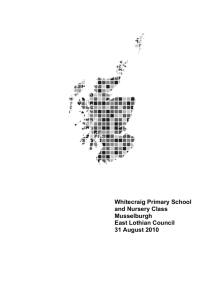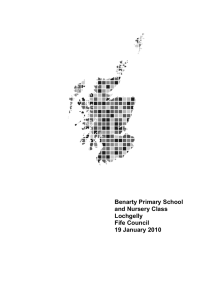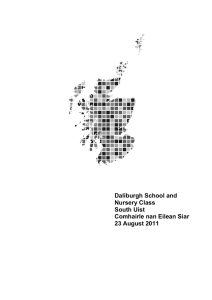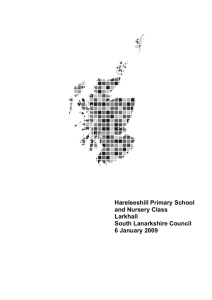South Morningside Primary School and Nursery Class The City of Edinburgh
advertisement
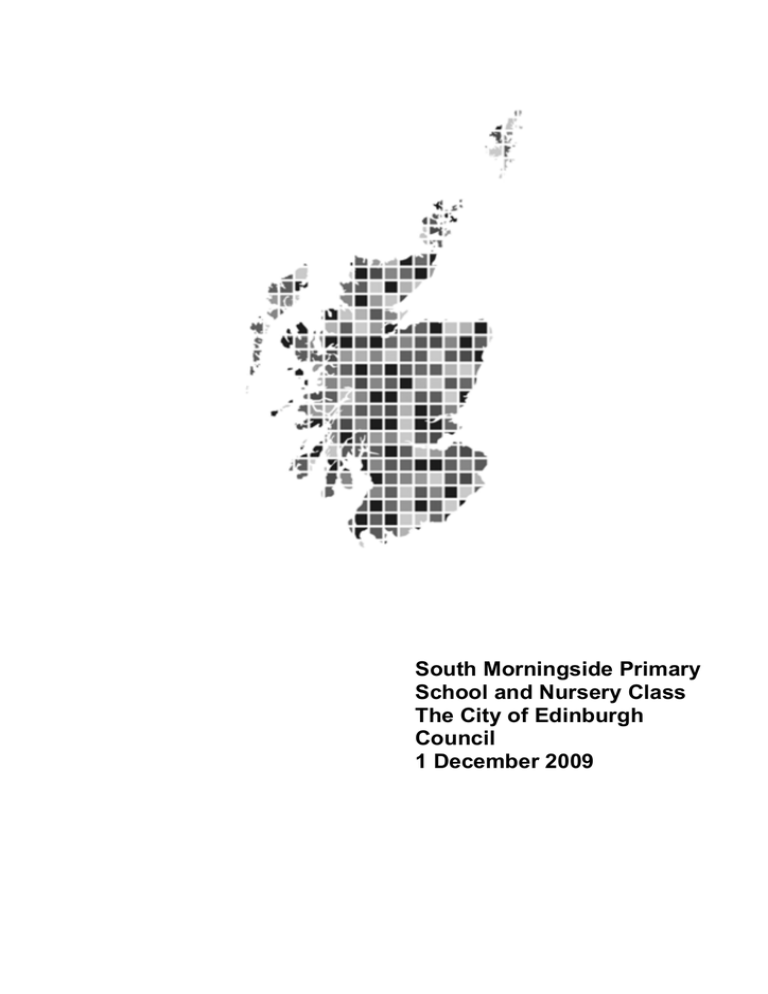
South Morningside Primary School and Nursery Class The City of Edinburgh Council 1 December 2009 HM Inspectorate of Education (HMIE) inspects schools in order to let parents1, children and the local community know whether their school2 provides a good education. Inspectors also discuss with school staff how they can improve the quality of education. At the beginning of the inspection, we ask the headteacher and staff about the strengths of the school, what needs to improve, and how they know. We use the information they give us to help us plan what we are going to look at. During the inspection, we go into classes and join other activities in which children are involved. We also gather the views of children, parents, staff and members of the local community. We find their views very helpful and use them together with the other information we have collected to arrive at our view of the quality of education. This report tells you what we found during the inspection and the quality of education in the school. We describe how well children are doing, how good the school is at helping them to learn and how well it cares for them. We comment on how well staff, parents and children work together and how they go about improving the school. We also comment on how well the school works with other groups in the community, including services which support children. Finally, we focus on how well the school is led and how staff help the school achieve its aims. If you would like to learn more about our inspection of the school, please visit www.hmie.gov.uk. Here you can find analyses of questionnaire returns from children, parents and staff. We will not provide questionnaire analyses where the numbers of returns are so small that they could identify individuals. Where applicable, you will also be able to find descriptions of good practice in the school. 1 Throughout this report, the term ‘parents’ should be taken to include foster carers, residential care staff and carers who are relatives or friends 2 The term ‘school’ includes the nursery class or classes where appropriate Contents 1. The school 2. Particular strengths of the school 3. How well do children learn and achieve? 4. How well do staff work with others to support children’s learning? 5. Are staff and children actively involved in improving their school community? 6. Does the school have high expectations of all children? 7. Does the school have a clear sense of direction? 8. What happens next? 1. The school South Morningside Primary School is a non-denominational school with a nursery class. It serves the areas of Morningside, Greenbank and Comiston in the south of Edinburgh. The roll was 653, including 42 in the nursery when the inspection was carried out in October 2009. Children’s attendance was above the national average in 2007/2008. The school and nursery class are situated across three sites. There have been a number of changes in staff recently. At the time of the inspection, the acting headteacher had been in post for five months and the temporary depute headteacher two months. 1 2. Particular strengths of the school • Polite, well-behaved children who are eager to learn. • The range of activities for children to achieve outwith the classroom. • Children’s achievements in listening, talking and reading. • Links with the community to enhance children’s learning. 3. How well do children learn and achieve? Learning and achievement In the nursery class, children enjoy learning and are developing friendships. Almost all cooperate well with each other. Children concentrate on their chosen activity for extended periods of time. They need more opportunities to take responsibility during their play. Across the primary stages, children are motivated and eager to learn both in and outwith the classroom. They feel well cared for within school. Children are enthusiastic when working together in pairs and groups. They respond positively to opportunities to take responsibility for their learning. At the early stages, children benefit from being involved in active learning through planned play activities. Overall, children do not yet have enough responsibility for evaluating what they do well or identifying what they need to do to improve their learning. In the nursery class, children are gaining an understanding of technology. They enjoy creating their own pieces of art work. For instance, older children are becoming confident in using fine brushes and a variety of colours to create interesting autumn pictures. Across the primary stages, children achieve well in a wide variety of activities, including through an extensive range of after-school activities. 2 Children have a clear understanding of environmental issues and, as a result, the school has achieved a silver Eco-Schools Scotland award. Children are developing their skills in information and communications technology (ICT) well. For example, those at P6 used ICT to create an informative magazine-style publication about themselves. Children’s skills in technology could be developed further. Children at P5 and P7 extend their personal and social skills very well through participating in residential excursions. In the nursery class, children are making satisfactory progress in their learning. Children listen well to stories and rhymes. They choose to look at books independently and most can recognise their name. A few children can write their name. Children are not yet confident in approaching early writing in all areas of play. In early mathematics, most children count to ten confidently. The majority make good use of mathematical language during play, for example, when weighing ingredients to make bread. They do not use their mathematical skills enough in all areas of play. Across the primary stages, children’s progress in listening, talking and reading is very good. Their progress in writing and mathematics is good. Almost all children achieve appropriate national levels of attainment in reading and mathematics and most do so in writing. In recent years, standards of attainment have remained high. Children requiring help with their learning are making appropriate progress. In English language, almost all children are articulate and confident when speaking. They demonstrate good skills when listening and talking to each other in groups. Children enjoy reading and talk confidently about books they have read. By P7, almost all children are skilled at describing characters and how the author develops the plot within a story. They comment confidently on how an author uses language to create effects. Most children write for a range of purposes and are developing good skills in punctuation and spelling. Children are capable of achieving a higher quality of writing. In mathematics, most children are accurate when making written and mental calculations. They have a secure understanding of the properties of two- and three-dimensional shapes and confidently identify lines of symmetry. 3 Children gather and present information well using a range of graphs and charts. Their skills in problem solving are not sufficiently well developed. Curriculum and meeting learning needs Staff have started to review the curriculum in line with Curriculum for Excellence. In the nursery, the curriculum is based appropriately on play and staff use the outdoor area well to broaden children’s learning opportunities. Across the primary stages, the school provides children with a broad curriculum. Staff are helping children make connections across learning and are beginning to develop children’s literacy and numeracy skills. They provide well-planned opportunities for children to develop their skills in enterprise education. Staff need to make more use of ICT to support children’s learning across the curriculum. Children benefit from learning French and German. A wide range of excursions and visitors to the school make learning more interesting for children. Children do not yet experience two hours of high quality physical education each week. Overall, staff meet children’s learning needs well. In the nursery class, staff know children very well and are aware of their individual learning needs. They plan activities at the right level for the majority of children. They do not always identify children’s next steps in learning effectively. Across the primary stages, on most occasions tasks and activities are at the right level of difficulty for children. At times, activities are not always challenging enough especially for higher achieving children. The school has appropriate procedures for identifying and supporting children with additional support needs. The support for learning teachers provide effective support for children requiring help with their learning. Recent changes to the role of learning assistants are having a positive impact on ensuring children’s learning needs are met. Overall, children requiring help with their learning are well supported and make appropriate progress. In examples of effective practice, teachers use questioning skilfully to 4 support and extend children’s learning and provide motivating homework activities. However, this is not consistent across the school. 4. How well do staff work with others to support children’s learning? Staff have developed effective partnerships with a range of agencies to support children’s learning, including the school nurse and speech and language therapist. The Parent Council supports the school well. Parents assist the school in a variety of ways, for example, by taking after-school activities. The school communicates effectively with parents through informative newsletters, e-mail and a regularly updated notice board. Staff consult parents about sensitive aspects of health education. Parents receive helpful information about their child’s progress. The school is good at sorting out complaints from parents and other members of the community. The school has highly effective links with the local community to enrich children’s learning. For example, children are increasing their knowledge of caring for the environment through strong links with Braidburn Valley Park. The school has developed well-planned arrangements for children as they move from nursery to P1 and from P7 to Boroughmuir High School. 5. Are staff and children actively involved in improving their school community? Children respond well to opportunities to take on responsibilities within the school. Older children enthusiastically act as buddies for younger ones. Through the pupil council children improve the school. Recently, they evaluated the impact of school excursions on their learning. The acting headteacher and depute headteachers use a range of approaches to evaluate and improve the work of the school, including monitoring children’s progress, reviewing forward plans and sampling children’s jotters. They provide staff and children with helpful comments to improve their practice. Staff are committed to the school 5 and most are receptive to new ideas. In the nursery class, staff are beginning to review their work and make necessary improvements. Across the primary stages, staff are involved in taking forward priorities identified in the improvement plan through working parties. This is improving children’s experiences. Some staff take part in a ‘reflective practitioners’ group’ to share ideas and practice which is helping to improve the quality of learning and teaching. All staff now need to be more involved in self-evaluation and have a shared responsibility for ensuring high quality experiences for children consistently. 6. Does the school have high expectations of all children? Children enjoy school and have positive relationships with staff. They are polite and very well-behaved. Children know what to do if they have any concerns, including using the ‘confidential’ box. Children’s achievements are recognised through displays, assemblies and in newsletters. Children are developing an understanding of global citizenship through learning about other cultures and links with a school in Malawi. Staff are aware of their roles and responsibilities in relation to child protection. They use praise well to encourage children in their learning. Staff have high expectations of children’s attendance and behaviour. They now need to have higher expectations of what children can achieve. There are regular opportunities for religious observance, including assemblies and celebrations in local churches. Local chaplains provide helpful support to the school, including working with children. 7. Does the school have a clear sense of direction? The acting headteacher is highly committed to improving the work of the school. She has identified what is working well and what now needs to improve. During her short time in post, the acting headteacher has improved the work of the school. The acting headteacher and depute headteachers work very well together and have a clear idea of how they want the school to develop. A few staff 6 readily take on leadership roles and take responsibility for aspects of the school’s improvement agenda. The school should build on this good practice, and clarify the roles and responsibility of all staff in taking forward leadership for learning. With continuity in staffing and the support of the education authority, the school has the capacity to improve. 8. What happens next? We are confident that, with support from the education authority, the school will be able to make the necessary improvements in light of the inspection findings. As a result, we will make no more visits in connection with this inspection. The school and the education authority will inform parents about the school's progress in improving the quality of education. Our District Inspector will maintain contact with the education authority to monitor improvements in learners' achievement. We have agreed the following areas for improvement with the school and education authority. • Increase opportunities for children to evaluate what they are doing well and what they need to do to improve their learning. • Improve approaches to evaluating the work of the school in order to ensure that children in the nursery and primary classes are making appropriate progress. • Extend leadership for learning at all levels. At the last Care Commission inspection of the nursery class there were, three recommendations made. These are being addressed. 7 Quality indicators help schools and nursery classes, education authorities and inspectors to judge what is good and what needs to be improved in the work of a school and a nursery class. You can find these quality indicators in the HMIE publications How good is our school? and The Child at the Centre. Following the inspection of each school, the Scottish Government gathers evaluations of three important quality indicators to keep track of how well all Scottish schools and nursery classes are doing. Here are the evaluations for South Morningside Primary School and Nursery Class. Primary school Improvements in performance Learners’ experiences Meeting learning needs good good good Nursery class Improvements in performance Children’s experiences Meeting learning needs satisfactory good good We also evaluated the following aspects of the work of the school and nursery class. The curriculum Improvement through self-evaluation HM Inspector: Janie McManus 1 December 2009 8 good satisfactory When we write reports, we use the following word scale so that our readers can see clearly what our judgments mean. excellent very good good means means means satisfactory weak unsatisfactory means means means outstanding, sector leading major strengths important strengths with some areas for improvement strengths just outweigh weaknesses important weaknesses major weaknesses If you would like to find out more about our inspections or get an electronic copy of this report, please go to www.hmie.gov.uk. Please contact us if you want to know how to get the report in a different format, for example, in a translation, or if you wish to comment about any aspect of our inspections. You can contact us at HMIEenquiries@hmie.gsi.gov.uk or write to us at BMCT, HM Inspectorate of Education, Denholm House, Almondvale Business Park, Almondvale Way, Livingston EH54 6GA. Text phone users can contact us on 01506 600 236. This is a service for deaf users. Please do not use this number for voice calls as the line will not connect you to a member of staff. You can find our complaints procedure on our website www.hmie.gov.uk or alternatively you can contact our Complaints Manager, at the address above or by telephoning 01506 600259. Where the school has a nursery class, you can contact the Complaints Coordinator, Headquarters, Care Commission, Compass House, Riverside Drive, Dundee DD1 4NY, telephone 0845 603 0890. Crown Copyright 2009 HM Inspectorate of Education

